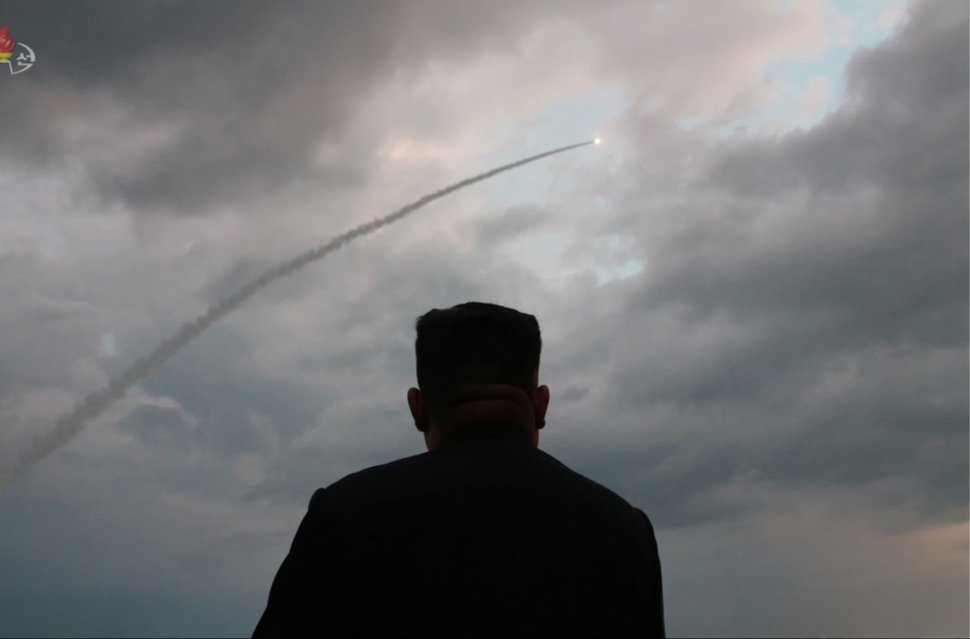 |
|
An image of North Korean leader Kim Jong-un overseeing the test launch of a missile on July 31, published by the Korean Central News Agency on Aug. 1. (Yonhap News)
|
Foreign Ministry statement throws cold water on Biegun’s dialogue resumption signals
The North Korean Foreign Ministry declared that “dialogue accompanied by military threats is of no interest to us.” In a “spokesperson’s statement” published on Aug. 22 by the Korean Central News Agency (KCNA), the ministry declared that “escalating hostile military moves by the United States and the South Korean authorities are reducing the dynamics of dialogue.” “This compels us to weigh a realistic way of turning our attention more to strengthening the physical deterrence,” the statement added, hinting at the possibility of Pyongyang adopting a hardline military response. At the same time, the statement reaffirmed Pyongyang’s strategic approach, stating that it remains “unchanged in our position to resolve all issues in a peaceful manner through dialogue and negotiation.” The statement was not a declaration that dialogue is off; rather, it sent the message that Pyongyang plans to continue pursuing negotiations, but will not take part in working-level talks with the US at the present time. It read as a negative response to remarks from US State Department Special Representative for North Korea Stephen Biegun, who told reporters after discussions in Seoul on Aug. 21 with South Korean Ministry of Foreign Affairs Special Representative for Korean Peninsula Peace and Security Affairs Lee Do-hoon that the US was “prepared to engage [in working-level talks] as soon as we hear from our counterparts in North Korea.” After meeting with North Korean leader Kim Jong-un at Panmunjom on June 30, US President Donald Trump announced that an agreement had been reached on resuming working-level talks within the next two to three weeks, but the talks have remained postponed since then. In an Aug. 16 statement by a spokesperson for its Committee for the Peaceful Reunification of the Country (CPRC), North Korea declared to Seoul that it had “nothing more to talk about with South Korean authorities” and “no desire to sit down with them again.” The latest statement took aim at both South Korea and the US. In South Korea’s case, it denounced the introduction of state-of-the-art US F-35A stealth fighters, stating that the “act of continuously introducing the cutting-edge lethal equipment is a grave provocation that has openly denied the joint declarations and the military agreement between the north and the south of Korea.” “[I]t only serves to graphically reveal again the hypocrisy and double-dealing conduct of the south Korean authorities who are noisily talking about making ‘efforts to do things more useful yet less harmful to dialogue,’” it continued. The message took aim at remarks from South Korean President Moon Jae-in, who sent Pyongyang a message in an Aug. 19 Blue House senior secretaries’ and aides’ meeting to the effect that success in dialogue could only be achieved in combination with mutual efforts to “do things more useful and less harmful to dialogue.” The statement also said that the “reality [of the US] adding to the regional arms race and confrontation [. . .] calls for our greatest vigilance.” As examples, it cited the US’ intermediate-range cruise missile test launch on Aug. 18, as well as its approval of the sale of 66 F-16V fighters to Taiwan and deployment of F-35 aircraft to South Korea and Japan, which it described as “dangerous and unusual military moves” that would “trigger a new cold war.” The criticism of the US’ approval of F-16V sales to Taiwan appeared aimed at introducing the “China variable.” Based on the arguments made in it, the statement was seen as a response to the strategic conclusion that efforts were needed to halt South Korea’s introduction of state-of-the-art weapons and the US’s aggressive military actions in Northeast Asia. Calling the statement part of a “blinking contest,” a former official experienced with “reading” North Korea predicted, “They are indeed going to taking part in working-level talks with the US.” Speaking on condition of anonymity, a veteran figure in the field of foreign affairs and national security said, “The North Korean Foreign Ministry has been taking a pretty combative stance lately, but that’s an expression of their aims of making sure they get they want in working-level talks with the US.” But the same figure also called the statement “an expression of unhappiness over President Trump’s failure to honor his promise to Chairman Kim at Singapore and Panmunjom not to engage in joint military exercises with South Korea.” “The situation isn’t a simple one, and I don’t expect the North will readily enter [working-level negotiations with the US],” they predicted. By Lee Je-hun, senior staff writer Please direct comments or questions to [english@hani.co.kr]






